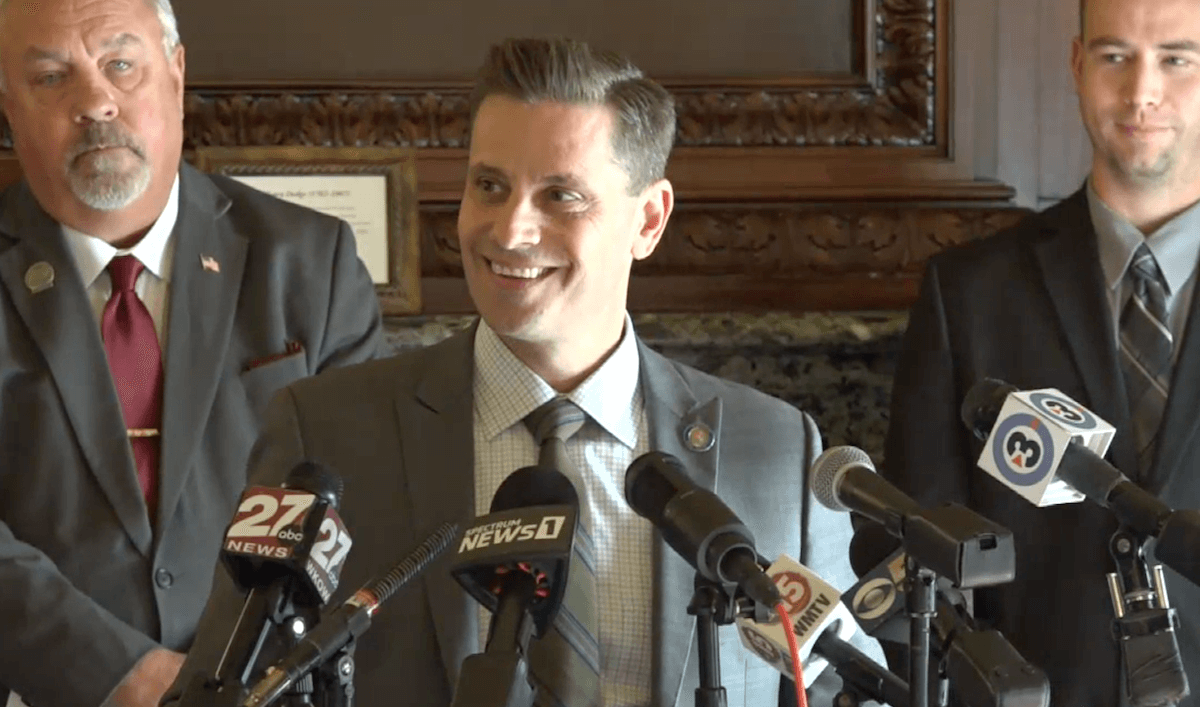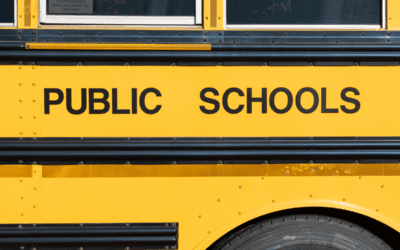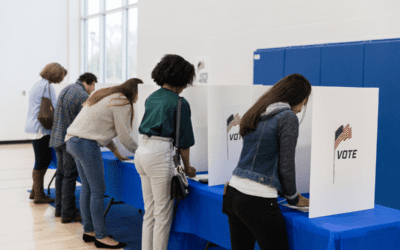
Senate President Chris Kapenga (R-Delafield) speaks during a press conference unveiling a Republican legislative package that would make it harder to access unemployment benefits and BadgerCare. GOP lawmakers claimed the bills will help address the worker shortage. (Screenshot via WisEye)
Despite a record-low unemployment rate, Republican lawmakers want to make it harder for unemployed and low-income people to access public assistance under the guise of addressing the worker shortage.
Under the guise of addressing the state’s workforce shortage, Wisconsin Republicans introduced a legislative package Tuesday that would make it harder for people to access health and unemployment services and create more unfunded mandates and red tape for already-underfunded social services.
The package of bills does not include provisions to attract more workers to Wisconsin—which is what experts have been saying the state needs for a decade—or address real barriers to unemployment, such as transportation, low wages, and the lack of child or elder care. Instead, it puts up barriers to prevent people who need public assistance from accessing it, and increases the workload for the Department of Workforce Development (DWD) and Department of Health Services (DHS) without any additional funding.
“We have this enormous need in the workforce, and we’ve got a lot of high-paying entry-level wages and then we have this, this large group of workers that have availability,” said Senate President Chris Kapenga (R-Delafield) in a Tuesday press conference introducing the package. “We’ve got a skilled workforce in the state of Wisconsin, and we have this barrier, or this wall, that it seems like the government has put in place. So we’ve been working on, how can we kind of deconstruct that barrier so that we can connect the two pools?”
The US Bureau of Labor Statistics announced Thursday that Wisconsin’s unemployment rate dropped to 2.8% in December. The state also has a 66.4% labor force participation rate, higher than the national rate at 61.9% and the 10th-highest participation rate in the country.
What Are the Real Issues?
So why can’t businesses find workers? Wisconsin’s workforce peaked in 2011 and experts have been saying for years that the state needed to attract more workers to replace the Baby Boom generation when they retire. More older Americans have retired since the start of the pandemic, exacerbating the issue.
The pandemic also forced many women out of the workforce as the care industry—child care, elder care, and care for people with disabilities—has become inaccessible for more families.
But instead of addressing those issues, the bills put forward by legislative Republicans are designed to make it harder for the people who receive benefits—many of whom are employed, single parents, or either elderly or disabled—to do so.
“Today’s GOP package fails to address the real challenges Wisconsin’s workforce faces,” said Minority Leader Greta Neubauer (D-Racine) in a press release. “Wisconsin’s unemployment rate is at a historic low, but instead of working to grow our workforce, legislative Republicans are doubling down on efforts to undermine Wisconsin’s unemployment system and jeopardize the critical assistance that keeps individuals and families afloat.”

Adding New Hoops
The package includes bills to cut unemployment insurance (UI) benefits and make them harder to access. One of the bills expands the definition of “misconduct” that would make people ineligible to receive UI. New ways to disqualify people from benefits would include if they violated their former employer’s social media policy, were fired for tardiness or absenteeism, declined or did not respond to a job interview or offer, or were not available for work that week.
The package would also make it harder for people receiving UI to access other programs, such as FoodShare and BadgerCare. One bill states that someone cannot decline more hours or higher wages in order to remain on BadgerCare. Wisconsin Republicans have refused to expand BadgerCare to people making up to 138% of the federal poverty line—about $18,000—even though over 70% of Wisconsinites support expansion.
RELATED: ‘People Don’t Want to Work’? Maybe They Just Retired Rather Than Expose Themselves to COVID.
Forcing employees to take more hours or higher wages would push the employees of some Republican representatives into a coverage gap, where they no longer qualify for BadgerCare but cannot afford private insurance.
Tamarine Cornelius, director of the Wisconsin Budget Project, said on Twitter that cutting off job seekers from benefits is actually counterproductive to finding long-term employment that fits their skills.
“One of the purposes of unemployment benefits is to give job-seekers room to find the right job for their skill set, instead of rushing into a job that isn’t a good fit,” Cornelius wrote. “Having a good match between employee and employer benefits everyone. This package would make that harder”
It also doesn’t address the core issue in Wisconsin: the need to attract more people to the state. Cornelius said legislation to improve quality of life and address needs such as transportation, child care, and more would go much further.
“Increasing the Wisconsin workforce is best done in ways that support families who are struggling to overcome barriers to work, not by creating new barriers for families who are struggling to get and maintain jobs,” Cornelius said.
Gov. Tony Evers has introduced legislation and initiatives attempting to do so by investing in communities, reinforcing the care industry, and empowering workers, but those efforts have not gained traction at the Capitol.
“Rather than focusing on programs that would actually help Wisconsinites,… Republicans are wasting time on politically driven legislation,” Neubauer said. “If GOP leadership were serious about helping people to find meaningful employment, they would work with Gov. Evers and legislative Democrats to address the realities that people are facing in Wisconsin.”
This package is being rolled out at the same time Republicans are moving forward with a bill that would allow people to receive UI benefits if they quit their job due to a vaccine requirement.

Opinion: Many to thank in fair maps victory for Wisconsinites
On February 19, 2024, Governor Tony Evers signed into law new and fair state legislative maps, bringing hope for an end to over a decade of...

Opinion: Empowering educators: A call for negotiation rights in Wisconsin
This week marks “Public Schools Week,” highlighting the dedication of teachers, paras, custodians, secretaries and others who collaborate with...

Op-ed: Trump’s journey from hosting The Apprentice to being the biggest loser
Leading up to the 2016 election, Donald Trump crafted an image of himself as a successful businessman and a winner. But in reality, Trump has a long...

Not just abortion: IVF ruling next phase in the right’s war on reproductive freedom
Nearly two years after the US Supreme Court overturned Roe v. Wade, another court is using that ruling to go after one of the anti-abortion right’s...




